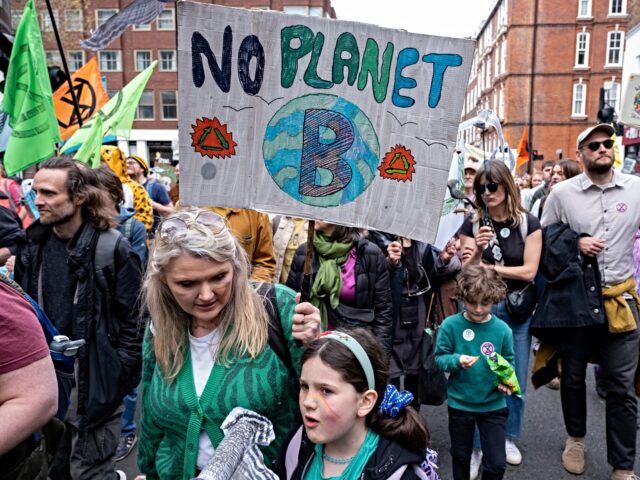Alarmists Cry: ‘Climate Change Spreads Brain Disease’
 Mike Kemp/In Pictures via Getty
Mike Kemp/In Pictures via Getty
The “neurological burden of climate change is becoming increasingly difficult to avoid,” writes Clayton Page Aldern, a former neuroscientist turned environmental journalist.
Global warming is not only destroying the planet, it is also causing “the spread of brain disease,” contends Aldern, author of the 2024 book The Weight of Nature: How a Changing Climate Changes Our Brains.
“As rising temperatures and shifting weather patterns reshape ecosystems, they’re not just altering landscapes — they’re creating new opportunities for neurological ailments to flourish and spread,” he argues.
One way that climate change causes brain disease is through the “expansion of zoonotic diseases,” he asserts, because as climate change forces animal populations into new territories, “the potential for pathogen spillover grows.”
RELATED: “Get The F*ck Out!” Elites Rage over Climate Protesters Disrupting the Met Opera
Climate change is also “awakening dormant dangers like the brain-eating amoeba Naegleria fowleri,” Aldern states, which can enter the brain through the nasal cavity and cause “devastating meningoencephalitis.”
Along with these brain diseases is the well-known psychological phenomenon of “eco-anxiety,” especially among children, who buy into the gloom-and-doom climate rhetoric of alarmists.
“The existential distress caused by environmental change is an all-too-real phenomenon linked to heightened rates of anxiety, depression, and even suicide,” Aldern writes. “For these communities, the scars of climate change are not just physical but deeply psychological.”
“Eco-anxiety, the chronic fear of environmental doom, is on the rise, particularly among young people,” he adds. “It’s a generational trauma, a weight carried by those who will inherit a world in chaos.”
Ironically, the author seems not to notice that the primary cause of this anxiety is the very sort of scaremongering he indulges in.
Climate change activists have studied people’s emotional response to climate expressions and purposefully selected the terminology that elicits the strongest reaction.
In July 2018, the Berkeley City Council in California issued a resolution declaring a worldwide “climate emergency,” calling it “the greatest crisis in history” after evoking memories of World War II.
The following month, Salon magazine announced it is time to “start panicking” over climate change.
RELATED: Oh, Cricket! Players Tackle, Carry Off Climate Protesters Disrupting Match
“It is time for us to panic about global warming,” wrote Salon contributor Matthew Rozsa. “Indeed, a proper state of panic is long overdue.”
In 2019, the Guardian newspaper released updates to its official in-house style guide intended to sharpen its climate change rhetoric in order to alarm readers and motivate them to action.
“Instead of ‘climate change’ the preferred terms are ‘climate emergency, crisis or breakdown’ and ‘global heating’ is favoured over ‘global warming,’” the Guardian stated.
“The phrase ‘climate change,’ for example, sounds rather passive and gentle when what scientists are talking about is a catastrophe for humanity,” said Katharine Viner, the Guardian’s editor-in-chief.
“Increasingly, climate scientists and organisations from the UN to the Met Office are changing their terminology, and using stronger language to describe the situation we’re in,” she said.
As activists attempt to scare people into becoming eco-warriors, it is no surprise that children are suffering psychologically as a result, since they do not possess the critical thinking skills necessary to separate the facts from the hype.
When children hear that the world is ending or that human civilization has only ten years to exist, they tend to believe it.
According to psychotherapist Caroline Hickman of the Climate Psychology Alliance (CPA), parents should learn to use gentler language in talking to their children about global warming.
RELATED: “We Need To Go To Work!” Commuters Angered by Climate Protest Road Blockades in London
zindulka“What you don’t want is that child to collapse in a well of depression saying, ‘what’s the point in going to university,’ or ‘what’s the point of doing my exams,’ which I have heard children say,” Hickman stated.
The Climate Psychology Alliance said psychiatric drugs have been administered to some children complaining of eco-anxiety.
The American Psychological Association defines “eco-anxiety” as “a chronic fear of environmental doom” from climate change.
Source link

